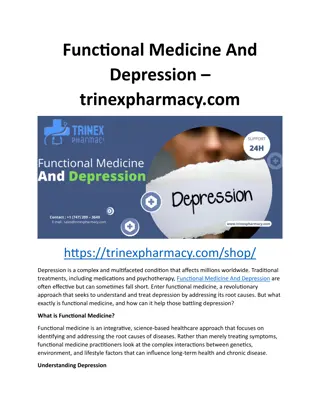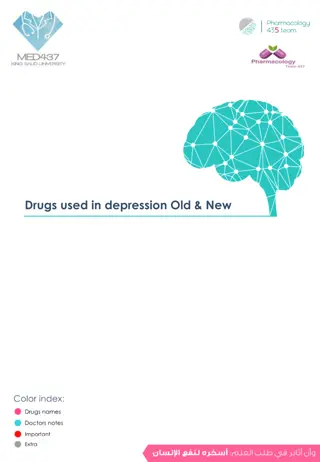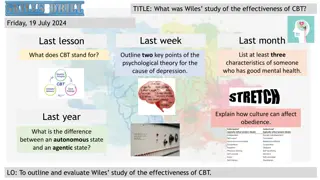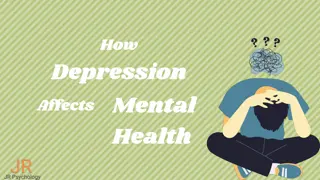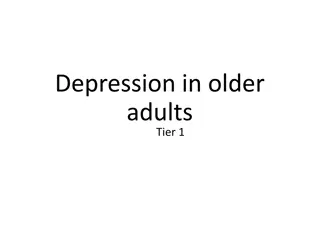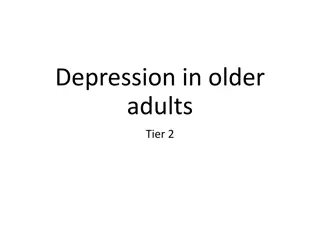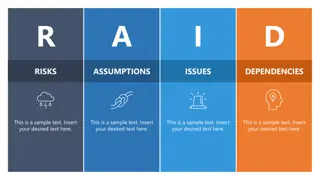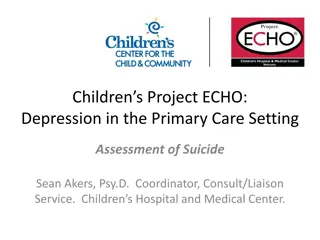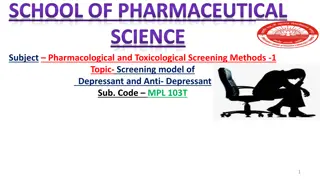
Collaborative Approach to Depression Care: Nutritional and Lifestyle Considerations
Explore the role of nutrition, lifestyle, and key nutrients in managing depression symptoms. Learn about client interactions, deficiencies in key nutrients, goals, and interventions for successful outcomes in depression treatment.
Download Presentation

Please find below an Image/Link to download the presentation.
The content on the website is provided AS IS for your information and personal use only. It may not be sold, licensed, or shared on other websites without obtaining consent from the author. If you encounter any issues during the download, it is possible that the publisher has removed the file from their server.
You are allowed to download the files provided on this website for personal or commercial use, subject to the condition that they are used lawfully. All files are the property of their respective owners.
The content on the website is provided AS IS for your information and personal use only. It may not be sold, licensed, or shared on other websites without obtaining consent from the author.
E N D
Presentation Transcript
Treatment of Clients Experiencing Depression A Collaborative Approach to Care January 27, 2018 * Tex-CHIP Training Series
Role of Nutrition & Lifestyle in Prevention/Management of Depression Symptoms
Understanding Provider Role in Preventing and Treating Depression Dietitians: Community vs. Clinical Community prevention is goal Clinical treatment, with some prevention opportunities Disease self-management and self-efficacy No food support Children: parents not giving independence to child w/disease Young Adults: eating disorders, excessive drinking Older Adults: loneliness
Considerations when Interacting with Clients Overweight or obese Lack quality sleep Sedentary lifestyle Disease state Food security Food patterns with no vegetables, fruits, processed foods Poor appetite, skipping meals, dominant desire for sweet foods
Deficiencies in Key Nutrients Omega 3 (essential fatty acid) Amino Acids: Tryptophan (essential) & Tyrosine Carbohydrates from whole grains Proteins B-complex Vitamins Folate Chromium Selenium Zinc
Goals & Related Interventions Interventions: Education for disease Food support: food bank, gardening, SNAP, Meals on Wheels, Congregate meal sites Fruits, vegetables, whole grains, meats, dairy, eggs Supplement Omega 3 (1-3g/day) Goals: Knowledge of disease Food security intake quality variety
Measuring Outcomes/ Success 2-Question Food Insecurity Screener: 1. Within the past 12 months we worried whether our food would run out before we got money to buy more 2. Within the past 12 months the food we bought just didn't last and we didn't have money to get more. Often, Sometimes, Never True Food support given More confidence in managing disease Eating healthier (however small improvement) Feel better
Communication with Counselors We need you! Source of depression Report on diet quality Food security status/socio-economic Ask if they enjoyed working with RD





